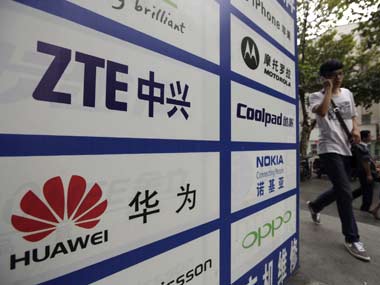New York: Now that a US Congressional committee has raised concerns about alleged spying from Chinese telecom gear makers, what is the future of these Chinese firms in India? The US may have dumped on China’s Huawei Technologies Co and ZTE Corp, but their operations in India are growing like gangbusters. That is not likely to change.
China’s Huawei, the world’s second-largest maker of routers and other telecommunication gear, plans to invest $2 billion in India. It is eyeing more business from Bharti Airtel, Vodafone and Idea Cellular.
Industry experts say the US report will not restrain cost-sensitive Indian carriers from buying Chinese telecom equipment. After all, Huawei and ZTE are among the cheapest suppliers of network equipment to India.
Equipment from them costs about a third of that sold by global rivals such as Alcatel-Lucent, L.M. Ericsson Telephone Company and Nokia Siemens. According to The Wall Street Journal , Huawei and ZTE also offer soft loans to telecom companies to buy or lease their equipment in India.
“India’s high-growth telecom sector needs equipment and devices for network expansion and operators are running low on resources,” Faisal Kawoosa, a telecom analyst at Cyber Media Research Ltd, told The Wall Street Journal.
“So, opting for cost-effective equipment is a necessity and, among the options available, vendors such as Huawei and ZTE have a clear edge over their Western competitors in terms of pricing,” Kawoosa said.
The 52-page House Intelligence Committee report from America ( details here ) puts telecom carriers around the world in a quandary: There is no doubt countries spy on each other. The Chinese government allegedly has a huge advantage in being able to leverage its close ties to Chinese telecom equipment manufacturers.
Britain’s parliamentary intelligence committee is also scrutinising China’s Huawei, as concerns mount on both sides of the Atlantic over the potential security threat stemming from the firm’s access to communication infrastructure.
The US has raised concerns about Chinese state influence on Huawei and ZTE. Because of that, the Congressional committee advised the US government and companies to consider buying their telecommunications gear from other companies.
This is unlikely to happen in India, where demand for cheap telecom equipment is likely to trump security concerns. But it remains to be seen whether the US probe will hurt the Chinese firms’ ability to bid for public tenders in India. According to the Journal, New Delhi raised similar security concerns in 2009 and 2010, when it stopped state-owned telecom operator Bharat Sanchar Nigam Ltd. from procuring gear from Huawei and ZTE, citing worries that they could be embedded with spy gear.
Security concerns gradually eased and, in August 2010, the Indian government allowed wireless operators Reliance Communications Ltd. and Tata Teleservices Ltd. to import telecom equipment from Huawei and ZTE.The government’s green light came on the condition that a laboratory had to first certify the equipment as spyware-free.
However, little can be done to protect routers and switches and other networking gear. Some ZTE gear has what the US intelligence committee views as a “backdoor,” a way for snoops to sneak into a network undetected. ZTE, though, refers to that as “a bug.”
US lawmakers have also cited other examples of equipment performing oddly with no explanation, such as “numerous examples” of “beaconing” by Huawei technology, which is when routers turn on in the middle of the night and send large data packs to China.
Huawei has lashed out at the US report, and said the move to get companies to ban using Huawei products was China-bashing, protectionism, and an egregious example of libel. It argues that the concerns over its Chinese origins are moot because most networking equipment is manufactured in China, even if other Western telecom gear makers are headquartered in Europe. By that logic, Huawei says the US government should extend its investigation into every company making equipment in China, including Western vendors.
US lawmakers have also underscored the threat to national security by allowing the gear of Huawei and ZTE to handle sensitive data over computer networks. Cisco is likely to be one of the biggest beneficiaries of the US investigation, and Huawei, has suggested in the past that Cisco is often behind the efforts to besmirch Huawei’s reputation.
)
)
)
)